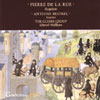Brumel Requiem; de la Rue Requiem
La Rue at his best, and The Clerks’ Group not very far off theirs
View record and artist detailsRecord and Artist Details
Composer or Director: Antoine Brumel, Pierre de La Rue
Genre:
Vocal
Label: Gaudeamus
Magazine Review Date: 2/2006
Media Format: CD or Download
Media Runtime: 56
Mastering:
Stereo
DDD
Catalogue Number: CDGAU352

Tracks:
| Composition | Artist Credit |
|---|---|
| Missa pro defunctis |
Pierre de La Rue, Composer
(The) Clerks' Group Edward Wickham, Conductor Pierre de La Rue, Composer |
Author: Fabrice Fitch
In these days of straitened circumstances for the recording of pre-Baroque repertories, the return of The Clerks’ Group after a hiatus of several years is welcome news. It’s odd that nobody thought before of bringing together these two works. The New London Chamber Choir recorded La Rue’s Mass for the Dead with Josquin’s Hercules Mass (Amon Ra – nla) and the Ensemble Clément Janequin with La Rue’s L’homme armé Mass (Harmonia Mundi, 9/89 – nla); but this is the first complete recording of Brumel’s setting.
It makes an interesting contrast to La Rue’s, being conceived in a simpler idiom. Brumel seems far less inclined than La Rue to draw out the contrapuntal possibilities inherent in the plainchant, and his setting of the Dies irae (the first polyphonic setting that survives) makes little of the text’s famously vivid imagery. Is it the less accomplished setting, then? Not necessarily: few of the earliest Requiem settings are particularly striking in their ‘response’ to the text, and Brumel is in this sense the more typical of its time. But there are two significant exceptions – those of Ockeghem and La Rue.
Though less overtly dramatic than Ockeghem’s (on which it is surely modelled), La Rue’s Requiem abounds in affecting inflections, especially in the latter movements. It is also scored for remarkably low-pitched voices and there seems no reason for The Clerks’ Group not to revel in the depth and lung-power of their basses. Their reading deepens in gravity along with the work itself, and by the end it carries such conviction that one is compelled to return to it. Brumel is well worth hearing, but on balance La Rue deserves top billing.
It makes an interesting contrast to La Rue’s, being conceived in a simpler idiom. Brumel seems far less inclined than La Rue to draw out the contrapuntal possibilities inherent in the plainchant, and his setting of the Dies irae (the first polyphonic setting that survives) makes little of the text’s famously vivid imagery. Is it the less accomplished setting, then? Not necessarily: few of the earliest Requiem settings are particularly striking in their ‘response’ to the text, and Brumel is in this sense the more typical of its time. But there are two significant exceptions – those of Ockeghem and La Rue.
Though less overtly dramatic than Ockeghem’s (on which it is surely modelled), La Rue’s Requiem abounds in affecting inflections, especially in the latter movements. It is also scored for remarkably low-pitched voices and there seems no reason for The Clerks’ Group not to revel in the depth and lung-power of their basses. Their reading deepens in gravity along with the work itself, and by the end it carries such conviction that one is compelled to return to it. Brumel is well worth hearing, but on balance La Rue deserves top billing.
Discover the world's largest classical music catalogue with Presto Music.

Gramophone Digital Club
- Digital Edition
- Digital Archive
- Reviews Database
- Full website access
From £8.75 / month
Subscribe
Gramophone Full Club
- Print Edition
- Digital Edition
- Digital Archive
- Reviews Database
- Full website access
From £11.00 / month
Subscribe
If you are a library, university or other organisation that would be interested in an institutional subscription to Gramophone please click here for further information.




